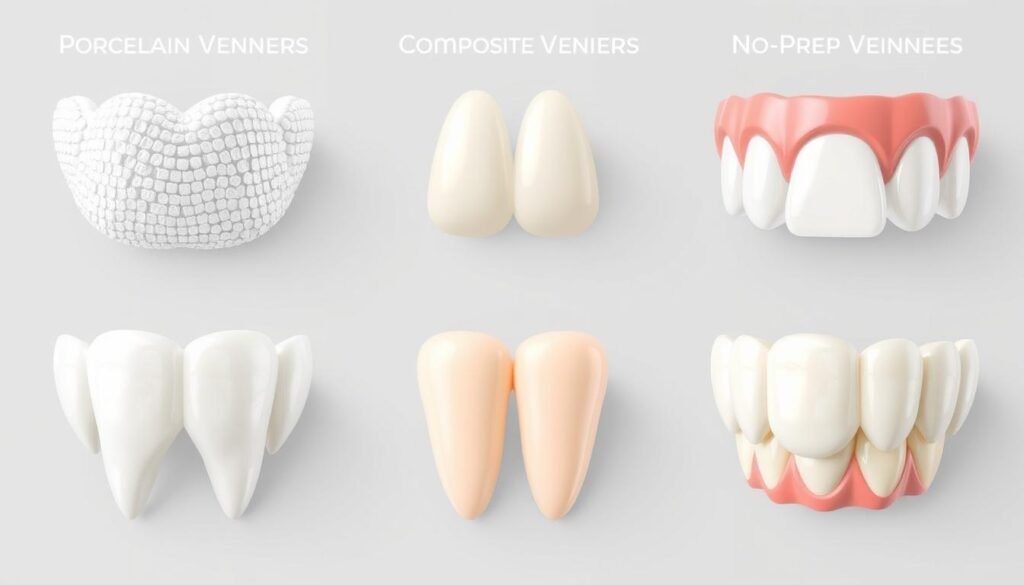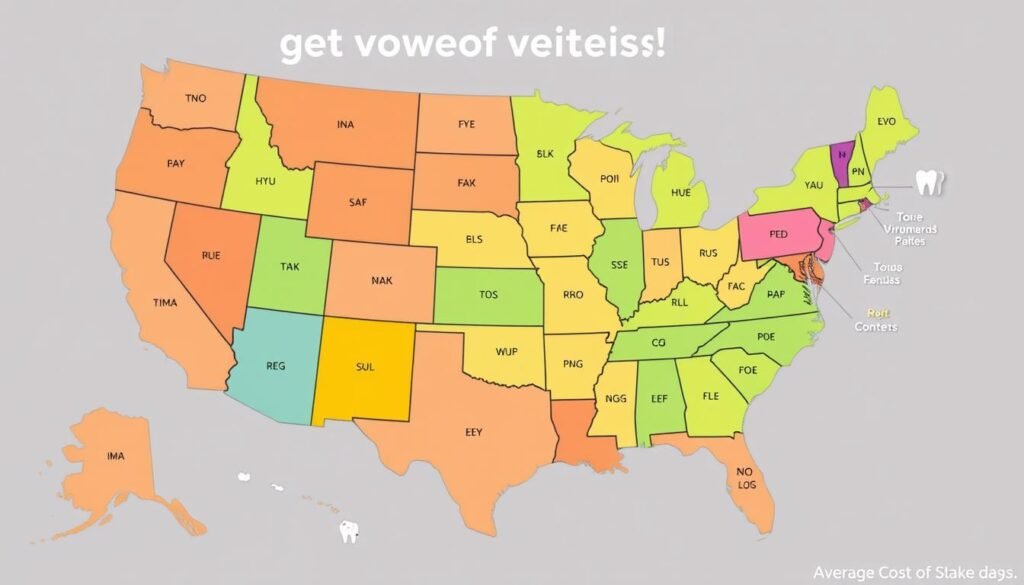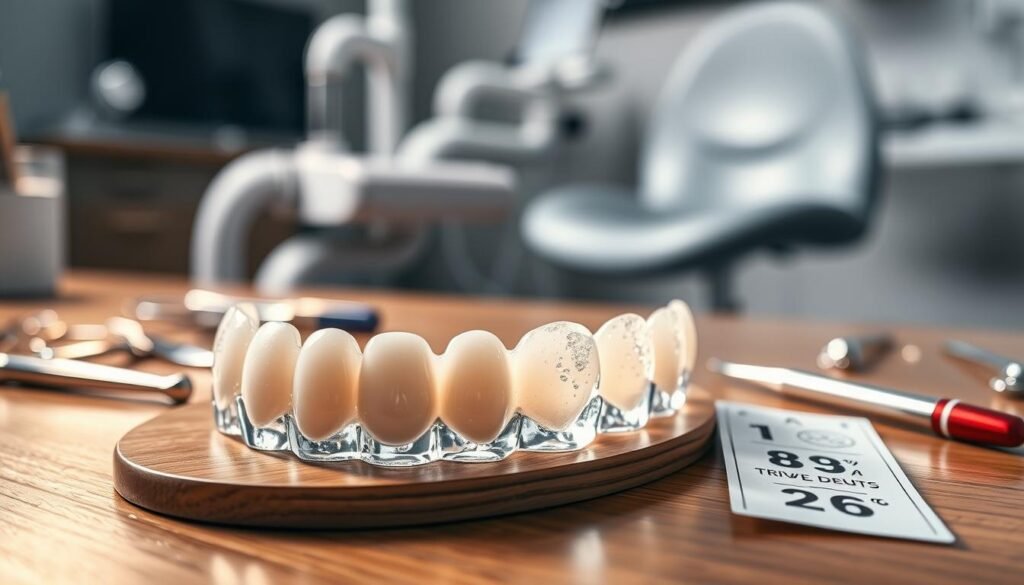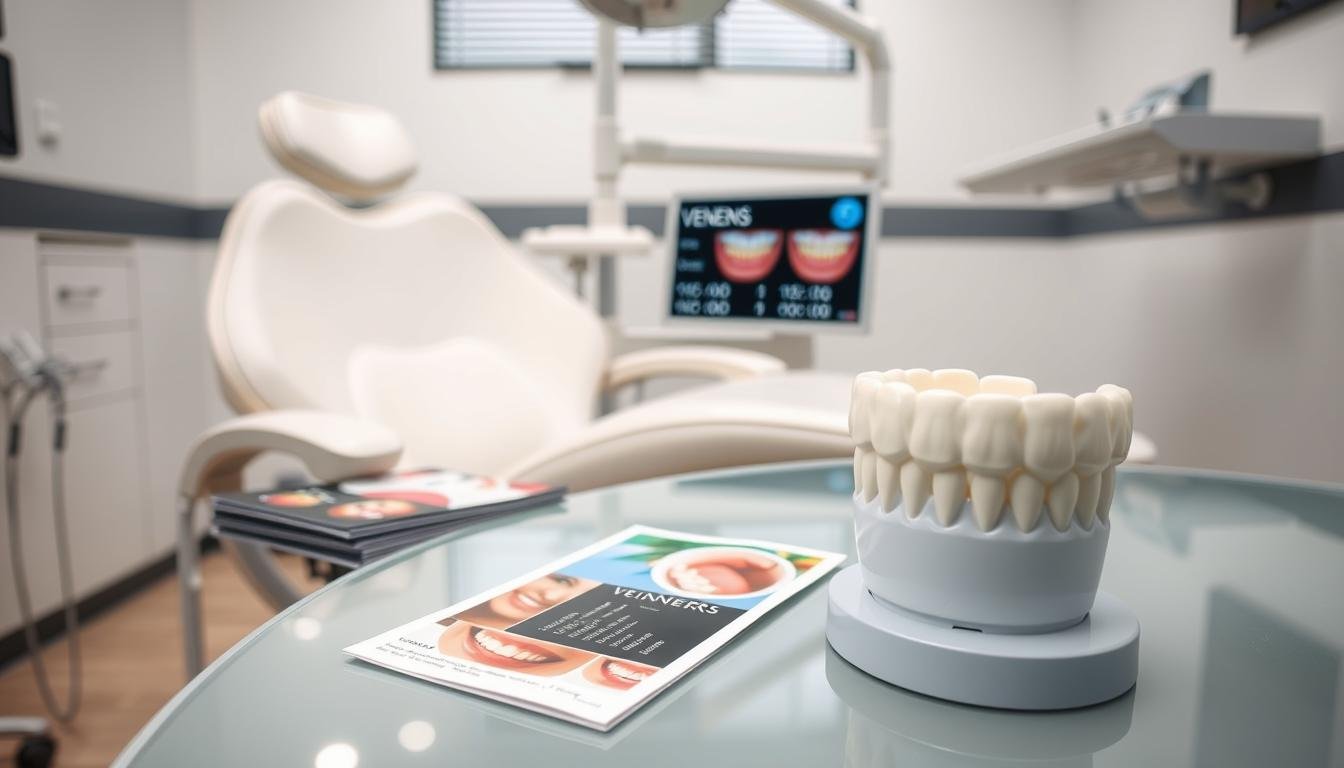Are you thinking about getting veneers to make your smile better? You might be wondering how much they cost without insurance. Many people ask this because veneers are seen as a cosmetic treatment. The price of veneers can change a lot, depending on several things. Knowing what affects the price can help you decide better.
Key Takeaways
- The national average cost for a single veneer is $1,765, with a range of $500 to $2,895 per tooth.
- A full set of 6-8 veneers averages $15,486 in the U.S.
- Veneers are typically not covered by insurance as they are considered a cosmetic procedure.
- Factors like materials, number of veneers, permanence, location, and dentist experience can affect the cost.
- Financing options like dental financing companies, credit cards, and payment plans can help make veneers more affordable.
What Are Veneers?
Veneers are thin, custom-made shells that go on the front of your teeth. They can change the shape, size, or look of your teeth. They also hide flaws. Many people choose veneers to get a brighter, even smile.
Types of Veneers
There are two main kinds of veneers: porcelain veneers and composite resin veneers. Each has its own good points and things to think about.
Porcelain Veneers
Porcelain veneers look very natural and can be shaped to fit your teeth perfectly. They’re made of thin, clear ceramic that sticks to your teeth. You’ll need a bit of your tooth enamel removed, but they last 10-15 years if you take good care of them.
Composite Resin Veneers
Composite resin veneers are made from the same stuff used for fixing teeth. You might not lose much enamel at all. They’re cheaper than porcelain veneers but don’t last as long, usually 2-5 years.

“Veneers are a great way to transform the appearance of your smile without extensive dental work.”
The Cost of Veneers: National Average and Ranges
The cost of veneers changes a lot based on the material type, where you live, and your dentist’s skills. Knowing these things can help you plan your budget for veneers.
Cost per Type of Veneer
Porcelain/Ceramic Veneers:
- National average cost: around $1,400
- Ranges between: $900 and $1,700
- Top 5% of expensive practices charge over $1,800
Resin (Composite) Veneers:
- Average cost: about $1,150
- Common range: $650 to $1,400
- Top 5% of dental offices charge more than $1,500
Cost per State
Veneer costs can change a lot by state. For instance, Vermont has the highest average cost at $2,359. Mississippi has the lowest at $1,349.
| State | Average Cost per Veneer |
|---|---|
| Vermont | $2,359 |
| New York | $2,187 |
| California | $1,987 |
| Florida | $1,712 |
| Mississippi | $1,349 |
Other things can also affect veneer costs. These include the dentist’s skills, how complex the procedure is, and any extra treatments needed. Looking into local options and knowing typical costs can help you decide on veneers.

How much do veneers cost without insurance
Veneers make your teeth look better. But, they can be expensive without insurance. Knowing the costs and what affects them can help you plan and decide.
A single veneer costs between $500 and $2,895. On average, it’s about $1,765. For a full set, you might pay $15,486. Most insurance doesn’t cover veneers because they’re for looks, not health.
Many things can change how much veneers cost. This includes the type of veneers, how many you need, and where you go for treatment. You might also pay extra for tooth prep, bonding, or touch-ups.
Even though veneers are costly, they can greatly improve your smile and confidence. Talking to your dentist about payment plans can help. This way, you can get the smile you want without breaking the bank.

Veneers without insurance can cost from $500 to $2,895 per tooth. A full set averages $15,486. The final price depends on the material, location, and dentist’s skills. Think carefully about spending on veneers and talk to your dentist about options that fit your budget.
Factors Affecting the Cost of Veneers
The cost of dental veneers can change a lot. It’s key to know what affects the price. Things like the material type, the dentist’s location, and their skills play a big part in the cost.
Type of Materials Used
The material you pick for veneers changes the price. Porcelain veneers cost more than composite resin ones. They are about $3,000 to $3,500 per tooth. Composite resin veneers are cheaper, costing $2,000 to $3,000 per tooth.
Number of Veneers Needed
How many teeth you need veneers for matters a lot. More teeth mean a higher cost. Talk to your dentist to know the total cost.
Permanence of the Veneers
How long veneers last can change the price. Porcelain veneers last 15 to 20 years and cost more. Temporary or removable veneers last 2 to 5 years and are cheaper, costing $300 to $500 per tooth.
Location
Where you get veneers done can change the price. Costs can go up because of living costs, overhead, and demand for dental services in an area.
Dentist
The dentist’s skills and experience can also affect the price. Dentists with more training or a focus on cosmetic dentistry might charge more. But, their work might be better quality.
In summary, the cost of dental veneers depends on many things. These include the material type, how many veneers you need, how long they last, where you get them, and the dentist’s skills. Talk to your dentist to get a clear price and make a good choice for your veneers.
| Veneer Type | Average Cost per Tooth | Estimated Lifespan |
|---|---|---|
| Porcelain Veneers | $3,000 – $3,500 | 15 – 20 years |
| Composite Resin Veneers | $2,000 – $3,000 | 10 – 15 years |
| No-Prep Veneers | $2,000 – $3,000 | 2 – 5 years |
“The cost of dental veneers can vary significantly, and it’s essential to understand the key factors that influence the overall price tag.”
Getting Veneers: The Process
Getting veneers takes a few steps for a great look. You can choose between porcelain or composite resin veneers. The steps are the same, but some details change.
- Consultation – First, your dentist will look at your teeth and talk about what you want for your smile. They’ll check if veneers are right for you. Then, they’ll suggest the best type of veneers for you.
- Preparation – Next, your dentist will remove a thin layer of enamel from your teeth. This makes room for the veneers and helps them look natural. They’ll take impressions or digital scans of your teeth for custom veneers.
- Temporary Veneers – Sometimes, your dentist might put on temporary veneers while your real ones are made in a lab.
- Placement – At your last visit, your dentist will check how well the veneers fit, look, and match your teeth. If everything’s good, they’ll bond the veneers to your teeth. This finishes the process of getting veneers.
Your dentist will work with you throughout the process of getting veneers. They’ll make sure the final look meets your expectations for the steps to getting veneers and what to expect when getting veneers. Good prep and focus on details are important for a natural, beautiful smile with veneers.
“The process of getting veneers can be life-changing, giving you the confidence to smile brightly and feel your best.”
Maintaining and Caring for Veneers
Keeping your veneers looking great is key. Composite veneers can last five to seven years. Porcelain veneers can last about 15 years. Here are easy steps to keep your veneers in great shape:
- Brush at least twice a day with a soft-bristled toothbrush and non-abrasive fluoride toothpaste.
- Floss daily to remove plaque and food particles.
- Maintain regular dental check-ups and cleanings to keep your veneers and underlying teeth healthy.
- Avoid hard foods and extremely hot or cold beverages, especially in the first few days after the veneers are placed.
- Brush after consuming staining foods and drinks like coffee, tea, and red wine to prevent discoloration.
By following these simple steps, you can help make your veneers last and keep a beautiful, confident smile for years.
“Proper oral hygiene and regular dental check-ups are the keys to keeping your veneers in top condition.”
With a little care and attention, your veneers can continue to look and feel their best. By following these tips for maintaining veneers, you’ll have healthy, beautiful teeth for life.
Conclusion
Veneers can cost a lot, with prices from $500 to $2,895 for one tooth. A full set costs about $15,486. The price changes based on the materials, how many veneers you need, and where you live.
Insurance usually doesn’t cover veneers. But, you can find ways to make them cheaper. Options like dental financing or payment plans can help.
Composite resin veneers are cheaper, costing $250 to $1,500 per tooth. Knowing about veneer costs and options can help you make a good choice. It’s about your smile and your wallet.
Looking into costs and options is key if you want a new smile. With the right info and a good dentist, you can find veneers that work for you and your budget.
FAQ
How much do veneers cost without insurance?
Veneers cost about
FAQ
How much do veneers cost without insurance?
Veneers cost about $1,765 on average for one tooth. They can be as low as $500 or as high as $2,895. A full set of veneers costs around $15,486 in the U.S.
Insurance usually doesn’t cover veneers because they’re for looks, not health.
What are veneers?
Veneers are thin, strong layers put on teeth’s front side. They’re made just for you and match your teeth’s color. They can change your teeth’s shape, size, or look to hide flaws.
What types of veneers are available?
You can get porcelain or composite resin veneers. Porcelain ones are very detailed and look real but need enamel removal. Composite resin ones are made from tooth bonding material and need little enamel removal.
What is the cost per type of veneer?
Porcelain veneers cost about $1,765 each. Composite resin ones cost $872 each if made in a dental office. If made in a lab, they cost $1,373 each.
How does the cost of veneers vary by state?
Veneers are most expensive in Vermont at $2,359. They’re cheapest in Mississippi at $1,349.
What factors affect the cost of veneers?
The cost changes based on the materials, how many veneers you need, their lasting power, where you get them, and the dentist’s fees.
What is the process of getting veneers?
Getting veneers starts with a consultation. Then, the dentist removes a bit of enamel and makes molds of your teeth. Finally, they put in the custom veneers.
How do I care for my veneers?
Keep your veneers clean by brushing twice a day and flossing. Go for regular dental check-ups and cleanings. Avoid hard foods and very hot or cold drinks, especially right after getting them. Brush after eating staining foods and drinks.
,765 on average for one tooth. They can be as low as 0 or as high as ,895. A full set of veneers costs around ,486 in the U.S.
Insurance usually doesn’t cover veneers because they’re for looks, not health.
What are veneers?
Veneers are thin, strong layers put on teeth’s front side. They’re made just for you and match your teeth’s color. They can change your teeth’s shape, size, or look to hide flaws.
What types of veneers are available?
You can get porcelain or composite resin veneers. Porcelain ones are very detailed and look real but need enamel removal. Composite resin ones are made from tooth bonding material and need little enamel removal.
What is the cost per type of veneer?
Porcelain veneers cost about
FAQ
How much do veneers cost without insurance?
Veneers cost about $1,765 on average for one tooth. They can be as low as $500 or as high as $2,895. A full set of veneers costs around $15,486 in the U.S.
Insurance usually doesn’t cover veneers because they’re for looks, not health.
What are veneers?
Veneers are thin, strong layers put on teeth’s front side. They’re made just for you and match your teeth’s color. They can change your teeth’s shape, size, or look to hide flaws.
What types of veneers are available?
You can get porcelain or composite resin veneers. Porcelain ones are very detailed and look real but need enamel removal. Composite resin ones are made from tooth bonding material and need little enamel removal.
What is the cost per type of veneer?
Porcelain veneers cost about $1,765 each. Composite resin ones cost $872 each if made in a dental office. If made in a lab, they cost $1,373 each.
How does the cost of veneers vary by state?
Veneers are most expensive in Vermont at $2,359. They’re cheapest in Mississippi at $1,349.
What factors affect the cost of veneers?
The cost changes based on the materials, how many veneers you need, their lasting power, where you get them, and the dentist’s fees.
What is the process of getting veneers?
Getting veneers starts with a consultation. Then, the dentist removes a bit of enamel and makes molds of your teeth. Finally, they put in the custom veneers.
How do I care for my veneers?
Keep your veneers clean by brushing twice a day and flossing. Go for regular dental check-ups and cleanings. Avoid hard foods and very hot or cold drinks, especially right after getting them. Brush after eating staining foods and drinks.
,765 each. Composite resin ones cost 2 each if made in a dental office. If made in a lab, they cost
FAQ
How much do veneers cost without insurance?
Veneers cost about $1,765 on average for one tooth. They can be as low as $500 or as high as $2,895. A full set of veneers costs around $15,486 in the U.S.
Insurance usually doesn’t cover veneers because they’re for looks, not health.
What are veneers?
Veneers are thin, strong layers put on teeth’s front side. They’re made just for you and match your teeth’s color. They can change your teeth’s shape, size, or look to hide flaws.
What types of veneers are available?
You can get porcelain or composite resin veneers. Porcelain ones are very detailed and look real but need enamel removal. Composite resin ones are made from tooth bonding material and need little enamel removal.
What is the cost per type of veneer?
Porcelain veneers cost about $1,765 each. Composite resin ones cost $872 each if made in a dental office. If made in a lab, they cost $1,373 each.
How does the cost of veneers vary by state?
Veneers are most expensive in Vermont at $2,359. They’re cheapest in Mississippi at $1,349.
What factors affect the cost of veneers?
The cost changes based on the materials, how many veneers you need, their lasting power, where you get them, and the dentist’s fees.
What is the process of getting veneers?
Getting veneers starts with a consultation. Then, the dentist removes a bit of enamel and makes molds of your teeth. Finally, they put in the custom veneers.
How do I care for my veneers?
Keep your veneers clean by brushing twice a day and flossing. Go for regular dental check-ups and cleanings. Avoid hard foods and very hot or cold drinks, especially right after getting them. Brush after eating staining foods and drinks.
,373 each.
How does the cost of veneers vary by state?
Veneers are most expensive in Vermont at ,359. They’re cheapest in Mississippi at
FAQ
How much do veneers cost without insurance?
Veneers cost about $1,765 on average for one tooth. They can be as low as $500 or as high as $2,895. A full set of veneers costs around $15,486 in the U.S.
Insurance usually doesn’t cover veneers because they’re for looks, not health.
What are veneers?
Veneers are thin, strong layers put on teeth’s front side. They’re made just for you and match your teeth’s color. They can change your teeth’s shape, size, or look to hide flaws.
What types of veneers are available?
You can get porcelain or composite resin veneers. Porcelain ones are very detailed and look real but need enamel removal. Composite resin ones are made from tooth bonding material and need little enamel removal.
What is the cost per type of veneer?
Porcelain veneers cost about $1,765 each. Composite resin ones cost $872 each if made in a dental office. If made in a lab, they cost $1,373 each.
How does the cost of veneers vary by state?
Veneers are most expensive in Vermont at $2,359. They’re cheapest in Mississippi at $1,349.
What factors affect the cost of veneers?
The cost changes based on the materials, how many veneers you need, their lasting power, where you get them, and the dentist’s fees.
What is the process of getting veneers?
Getting veneers starts with a consultation. Then, the dentist removes a bit of enamel and makes molds of your teeth. Finally, they put in the custom veneers.
How do I care for my veneers?
Keep your veneers clean by brushing twice a day and flossing. Go for regular dental check-ups and cleanings. Avoid hard foods and very hot or cold drinks, especially right after getting them. Brush after eating staining foods and drinks.
,349.
What factors affect the cost of veneers?
The cost changes based on the materials, how many veneers you need, their lasting power, where you get them, and the dentist’s fees.
What is the process of getting veneers?
Getting veneers starts with a consultation. Then, the dentist removes a bit of enamel and makes molds of your teeth. Finally, they put in the custom veneers.
How do I care for my veneers?
Keep your veneers clean by brushing twice a day and flossing. Go for regular dental check-ups and cleanings. Avoid hard foods and very hot or cold drinks, especially right after getting them. Brush after eating staining foods and drinks.
